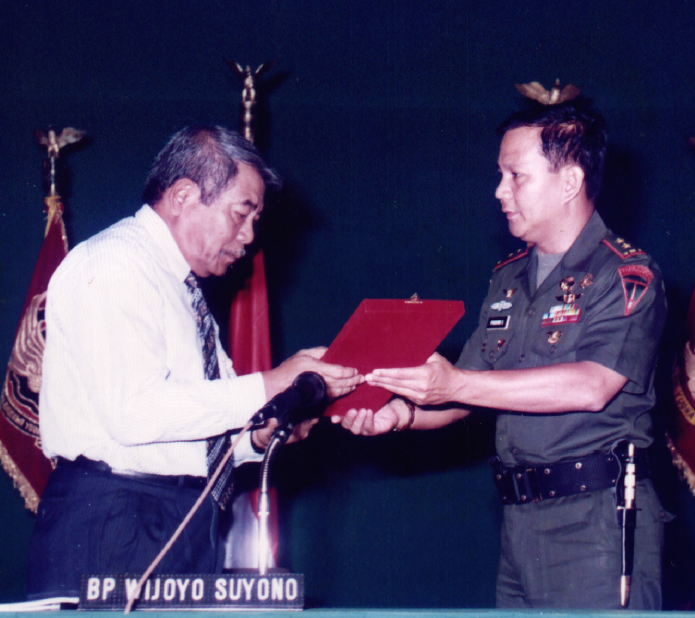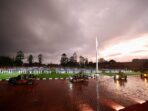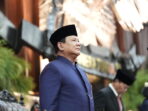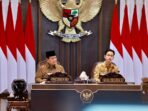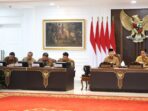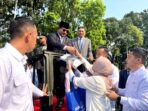GENERAL TNI (RET.) AGUM GUMELAR
I know Pak Agum as a highly intelligent officer with a good physique. He is also a charismatic sportsman. He is amiable and excellent in earning sympathy from his men, superiors, colleagues, and the general public. Pak Agum has mastered Sandi Yudha operational intelligence. He has a persuasive leadership style. He is a man who sticks to his principles, and he does not mind criticising his superiors, even if it means putting his career on the line. Pak Agum was once my commander before he became the commander of KOPASSUS. Then, I was the Commander of Group 3 Special Forces Training and Education Center (Pusdikpassus). However, I had known him before I joined the military. He was a family member of a KOPASSUS officer Captain Margono, who had been an aide to my father when he served as the Minister of Commerce in Pak Harto’s Cabinet in 1968. I know Pak Agum as a highly intelligent officer with a good physique. He is a sportsman and a charismatic man. He is amiable and excellent in earning sympathy from his superiors, compatriots, and people in general. Pak Agum is well-versed in Sandi Yudha (combat intelligence), and he has a persuasive leadership style. He is a man who sticks to his principles, and he has no qualms about criticising his superiors, even if it means putting his job on the line. I believe I may have had many miscommunications with him in our lives since there were some issues over which we did not see eye to eye. However, objectively, I consider Pak Agum as a respectable leadership figure for Indonesia.
LIEUTENANT GENERAL TNI (RET.) YUNUS YOSFIAH
My impression of Pak Yunus Yosfiah’s leadership is that he is always calm, never frantic, never nervous. His leadership is an example of self-control. Once a commander panics, faints or fails to act upon contact with the enemy, he loses his authority for good. Thus, it is said that the first exchange of gunfire is decisive. Pak Yunus is also an unyielding personal figure. He would do anything to achieve victory and not accept any excuses. He is determined and very strong-willed. He was often considered too harsh on his men. Before he became a general, he would check his troops himself, and everything had to be in order. Anyone who made mistakes would be ordered to march with a heavy backpack or do at least 18 pull-ups. Indeed, life in the army is difficult. Battlefields are full of shock, surprises, and fear. If we are not used to dealing with such conditions, the tendency to be panicked, nervous, paralysed, and perplexed is very high. Harsh preparation saves lives.
The first time I got to know Pak Yunus Yosfiah was during an operation in East Timor, where he served as the Commander of a Special Team under the codename Nanggala 10. This Special Team was formed because the operations in December 1975-January 1976 were not progressing as fast as expected. So it took a team from KOPASSUS as a strike force with high mobility and high spirit. Pak Yunus was the one leading this team. After passing commando training on December 20, 1975, the new Lieutenants of the graduation year 1974 of AKABRI, including myself, officially joined the Group 1 Para-Commando/Kopassandha. On December 7, while we were still in Batujajar, we heard that the Red Berets and Green Berets from Kopassandha and the 17th and 18th Brigades had jumped to East Timor. Some of our seniors lost their lives during the deployment. As soon as we passed commando training, we immediately reported to Kopassandha Headquarters in Cijantung, East Jakarta. After that, we were only given a two-week break. We started in January. Group 1 Para- Commando was vacant then as almost all the troops were on duty in East Timor. There was only one company on standby consisting of the remaining troops. During that time, I had just started as the Platoon Commander (Danton). First Lieutenant Mujain served as the Company Commander (Danki). He was from Secapa. He had been involved in the Trikora operation – a popular mobilisation to seize and liberate West Irian – under Pak Benny Moerdani. Pak Benny was awarded Bintang Sakti, Indonesia’s equivalent to the US Medal of Honor, for his outstanding service in the Trikora operation. Around February, HQ notified us that a special team would be formed, consisting of Group 1, Group 2, and Headquarters Detachment. The force would be led by officers who had just passed commando training, namely First Lieutenants of the graduation year 1971 and Second Lieutenants of 1974. The First Lieutenants at the time were Infantry First Lieutenant Yotda Adnan, Infantry First Lieutenant Suwisma, Infantry First Lieutenant Syahrir, Infantry First Lieutenant Untung Setiawan, Infantry First Lieutenant Zarnubi and First Lieutenant CHB Harjono. The First Lieutenants served as Unit Commander of a 20-strong unit. Pak Yunus Yosfiah was appointed to lead the Special Team. That was how I got to know Pak Yunus. He is slender, of medium height, not too tall. In his leadership, Pak Yunus always sets excellent examples. The philosophy of ing ngarsa sung tulada (leading from the front) best describes him. His backpack was as heavy as that of his men. For a 14-day mission, for example, each of us brought 28 cans of T2 rations. Each can weigh around 300 grams, so about 9 kg in total. This did not include bullets, spare clothes and many others. A total load of our backpack was about 18-20 kg. It was even heavier because the quality of the backpack at the time was not as good as it is today. The backpack itself was heavy enough. With such conditions, we could not bring jackets and other items. Despite being our Commander, Pak Yunus carried just as much and as heavy as we did. This simple action was worth more than hours of lectures. If the leader bears the same heavy burden as his men, the men will be obedient and faithful. So leaders can save themselves many lengthy lectures by simply setting an example worth following. Once, in 1984, I accompanied Pak Yunus on a marathon starting from Senayan in South Jakarta. He was a Colonel while I was Captain. By the time we got to Harmoni in Central Jakarta, a friend of mine, an officer, asked for permission to use the lavatory, but he did not come back. To be honest, I also wanted to run away. But how could I ‘disappear’ while Pak Yunus was running by my side? That is one of the characteristics of Pak Yunus. My impression of his leadership was one of composure, always calm, not frantic, never seeming nervous. It is a lesson for all of us. Once a commander panics, becomes nervous, faints or fails to act upon contact with the enemy, he loses his authority for good. Thus, it is said that the first gunfire exchange is decisive. Pak Yunus is also an unyielding soldier. He would do anything to achieve victory and would not accept any excuses. Pak Yunus is determined and very strong-willed. He is even often considered too harsh on his men. Before he became a general, he would check on his troops, and everything had to be in order. Anyone who made mistakes would be ordered to march with a heavy backpack or do at least 18 pull-ups. If we are not used to dealing with such conditions, the tendency to be panicked, nervous, frozen with fear and perplexed is very high. I should say this is based on the experience of one of my seniors. This man was brilliant at AKABRI, very smart academically, but, unlike Pak Yunus, he froze up on the battlefield. He had to be evacuated from the battleground. However, I felt that I had reaped the benefits of having a commander like Pak Yunus early in my career as an officer. I always tell everyone that I became the person I am today because, among others, I had Pak Yunus Yosfiah as my commander.
LIEUTENANT GENERAL TNI (RET.) SOEGITO
A leader must be among his men, and that was where Pak Soegito always was. He was always…
